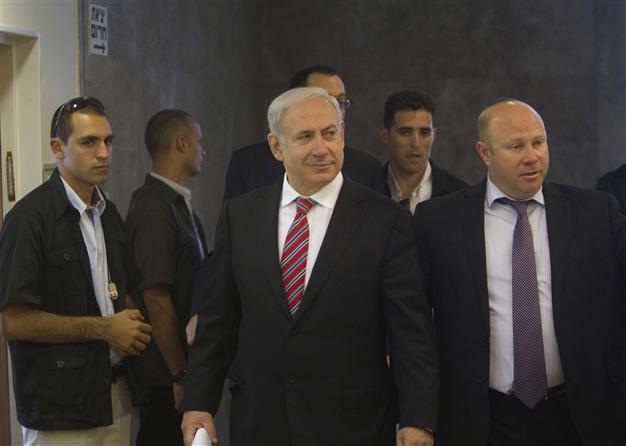Israel PM considers early election
JERUSALEM - Agence France-Presse

Israel's Prime Minister Benjamin Netanyahu, center, arrives to the weekly cabinet meeting in Jerusalem Sunday, April 29, 2012. (AP Photo/Ronen Zvulun, Pool)
Israeli premier Benjamin Netanyahu today said he would consider an early general election, a day after a key coalition partner threatened to pull out and the opposition called for an autumn vote."Prime Minister Benjamin Netanyahu said that no decision has been made yet, but he will be consulting with coalition partners about the possibility of advancing the elections," an official quoted him as telling ministers from his ruling right-wing Likud party.
"He said that when we get to the budget negotiations at the end of (2012), if people will be approaching with irresponsible, populist budget demands, then he prefers to go to elections, since he doesn't want to undermine the success of the last three years," he told AFP.
The press was awash with fresh speculation about an early general election on Sunday as Netanyahu fought off sharp criticism from a former top security chief over his policies on Iran's nuclear programme and on peace with the Palestinians.
Talk of an early vote, which has been in the air for several months, was revived by Foreign Minister Avigdor Lieberman who on Saturday said his Yisrael Beitenu party had exhausted its commitment to the coalition in a dispute over the issue of drafting Orthodox Jews into the army.
"I think that our obligation to the coalition is over," Lieberman told Israel's privately owned Channel Two television. "There is also an obligation to the voter and, when the coalition is not prepared to compromise with us, we shall take decisions." The country would only know whether or not it was heading for early elections "after May 9," he said of the date when parliament is expected to discuss new legislation to replace the outgoing Tal Law, which allowed ultra-Orthodox Jews to defer their service in the Israeli military.
Lieberman's ultra-nationalist party, which is staunchly secular, is the second largest in Netanyahu's coalition after his own right-wing Likud, and it is the third-largest in parliament.
Netanyahu on Sunday insisted that the Tal Law would be replaced by legislation which was much more balanced.
"The Tal Law will be replaced by a more egalitarian and just law, and I will submit it" in the current parliamentary session, Netanyahu said at the start of the weekly cabinet meeting.
"The new law will also include civilian service for Arabs," he said.
Opposition leader Shaul Mofaz said his centre-right Kadima party would move to dissolve parliament in the coming weeks if Netanyahu did not heed calls for an early vote.
"The days of Netanyahu's government are numbered," wrote Mofaz on his Facebook page on Saturday.
"I call for a general election to take place at the earliest possible date," he said, proposing they be held on October 16, and urging Netanyahu to set a date as soon as possible.
"If he doesn't, Kadima will move to dissolve parliament as early as next week," he warned.
The general election is currently slated to take place in October 2013.
Although speculation about an early election was mentioned in all the main papers, Sunday's headlines were dominated by remarks made by Yuval Diskin, former head of the Shin Bet internal security service, in which he launched a blistering attack on Netanyahu and his Defence Minister Ehud Barak.
Diskin, who stepped down last May, accused the pair of misleading the public over the chances that a pre-emptive Israeli strike on Iran's nuclear facilities would successfully stop Tehran from developing an atomic bomb.
"I have no faith in the current leadership, which must lead us in an event on the scale of war with Iran or a regional war," Diskin said. "They are misleading the public on the Iran issue. They tell the public that if Israel acts, Iran won't have a nuclear bomb. This is misleading. Actually, many experts say that an Israeli attack would accelerate the Iranian nuclear race." He also said Netanyahu had no interest in talking peace with the Palestinians because it would threaten the stability of his coalition.
"I'm telling you, we're not talking with the Palestinians because this government has no interest in talking with the Palestinians," he said, in remarks quoted by the Maariv newspaper.
"The prime minister knows that if he takes even the smallest step forward on this issue then ... his strong coalition will fall apart. It's that simple."
















